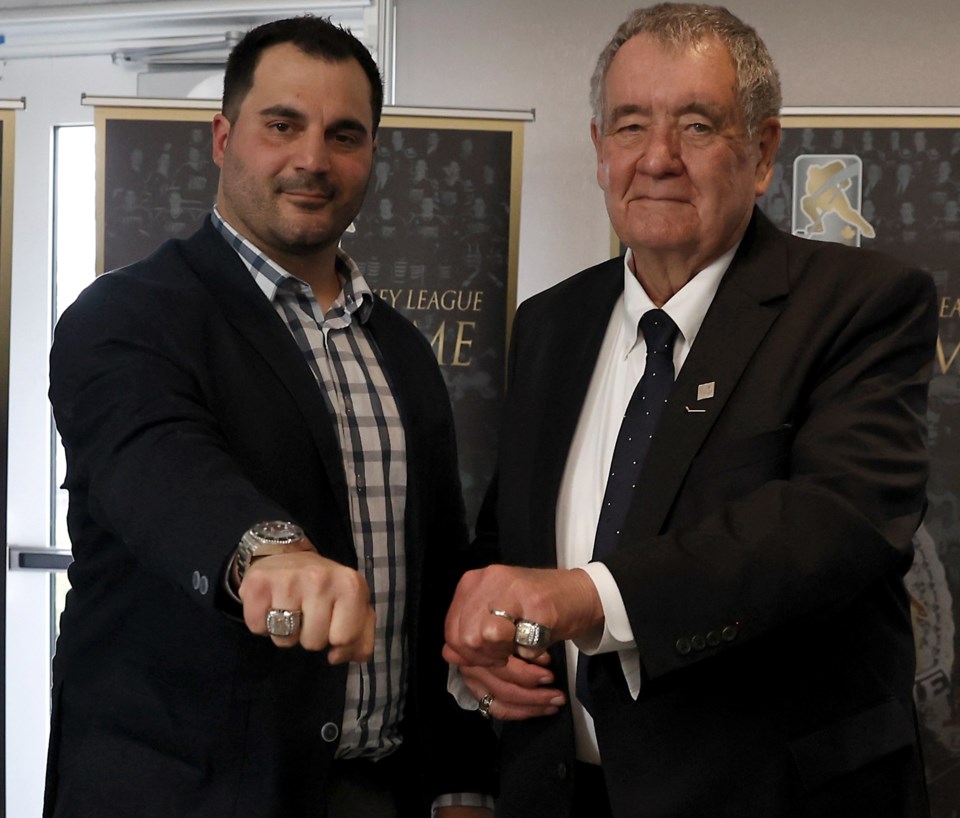When Bob Hooper was 19 years old, he was asked to coach a Georgetown novice house league team.
The first-time coach led the team to a first-place finish and the league championship. However, Hooper didn’t win any fans among his fellow coaches, who accused him of not following the rules about distributing ice time evenly.
The next year with league officials watching closely, Hooper’s team finished last. But the coach realized the ice time rule did not apply during the playoffs. So when the post-season rolled around, his team rallied to claim a second straight championship.
Though he technically had not broken any rules, Hooper was not asked back to coach for a third season.
So it might seem a little ironic that the bender of rules would eventually become the commissioner and chief rule enforcer of Canada’s largest junior hockey league.
“When Brent Ladds (of the Ontario Hockey Association) introduced me to the teams as the commissioner, he said, ‘If you guys try to do something to pull the wool over this guy’s eyes, it’s not going to work, because anything you can think of, he’s already done.’”

Hooper served as the Ontario Provincial Junior A Hockey League (now Ontario Junior Hockey League) commissioner from 1996 to 2009, in which the league grew from 22 teams to 37, won a battle with the rival Metro Junior Hockey and helped establish the league as a destination to play.
Now Hooper is among the OJHL’s initial Hall of Fame class, joining NHL greats Paul Coffey, Adam Oates and Steve Thomas, as well as the league’s all-time leading scorer Josh Soares.
Hooper brought a wealth of experience to the role, having worked in team management with the Georgetown Raiders and Georgetown Gemini. He was the Raiders’ president in 1982 when the team won the Hardy Cup, the Canadian intermediate championship.
When he took over as commissioner, it was an important time in the league’s history. It was competing for players with the rival Metro Junior Hockey League. The OPJAHL would ultimately triumph and in 1998 absorbed 15 Metro League teams to become the country’s largest junior league.
The league was not only competing with the Metro League for players. Many of the league’s top players were leaving for British Columbia and Alberta, which dominated the national championship (the Royal Bank Cup, now Centennial Cup) through the 1990s, at one point winning nine of the 11 Canadian titles, with Ontario being shut out.
Hooper wanted to create an environment where the league’s top teams could succeed at the national level. The Aurora Tigers would break through and win in 2004 and again in 2007, bringing the league its first national titles.
“Winning those two championships, we had more kids coming to Ontario from out west than were going out there,” Hooper said. “The owners didn’t believe that could happen.”
Hooper took a no-nonsense approach to the job. Even when faced a master rule-bender in former NHL coach Roger Nielsen, Hooper refused to back down. Nielsen, who owned the Lindsay franchise, was trying to delay a one-game playoff to determine the final playoff spot. Hooper fielded calls from Nielsen all day and without a resolution in sight, Hooper said, “Roger, have your team in Orillia at 12:30 p.m. Sunday, or you’ll forfeit.” They played the game.
Hooper also boycotted the 2002 Dudley Hewitt Cup when the league was informed mid-season that it would also have to compete with the new Superior International Junior Hockey League. Feeling the league already had an arduous path to the national championship with its teams having to win six playoffs rounds, he was not happy with another league now standing in the way.
The Northern Ontario Junior Hockey League also planned to boycott, but eventually caved. Hooper stood his ground, leading to the creation of the Dudley Hewitt Cup tournament the next season. He would help co-ordinate Georgetown’s bid to host the 2005 tournament.
Hooper said it was not a solo effort, though.
“I had really good people around me. Five or six people that really know hockey and participated in hockey. Murray Walker, Pat Wilkinson, Finn Poulstrup. They made my job a lot easier.”
But through his entire tenure, despite the long hours it required, Hooper refused to accept any payment. He was the only junior hockey commissioner in the country to not receive a salary. Hooper said it was because he didn't want it to be a full-time job, even though the hours said otherwise.
For Hooper, the job was the reward.
“I got to meet a lot of good people, that was the best part of it,” he said. “It was a great experience, I got to see places all across Canada, places that I would have never gone to, that I went to for hockey.”
